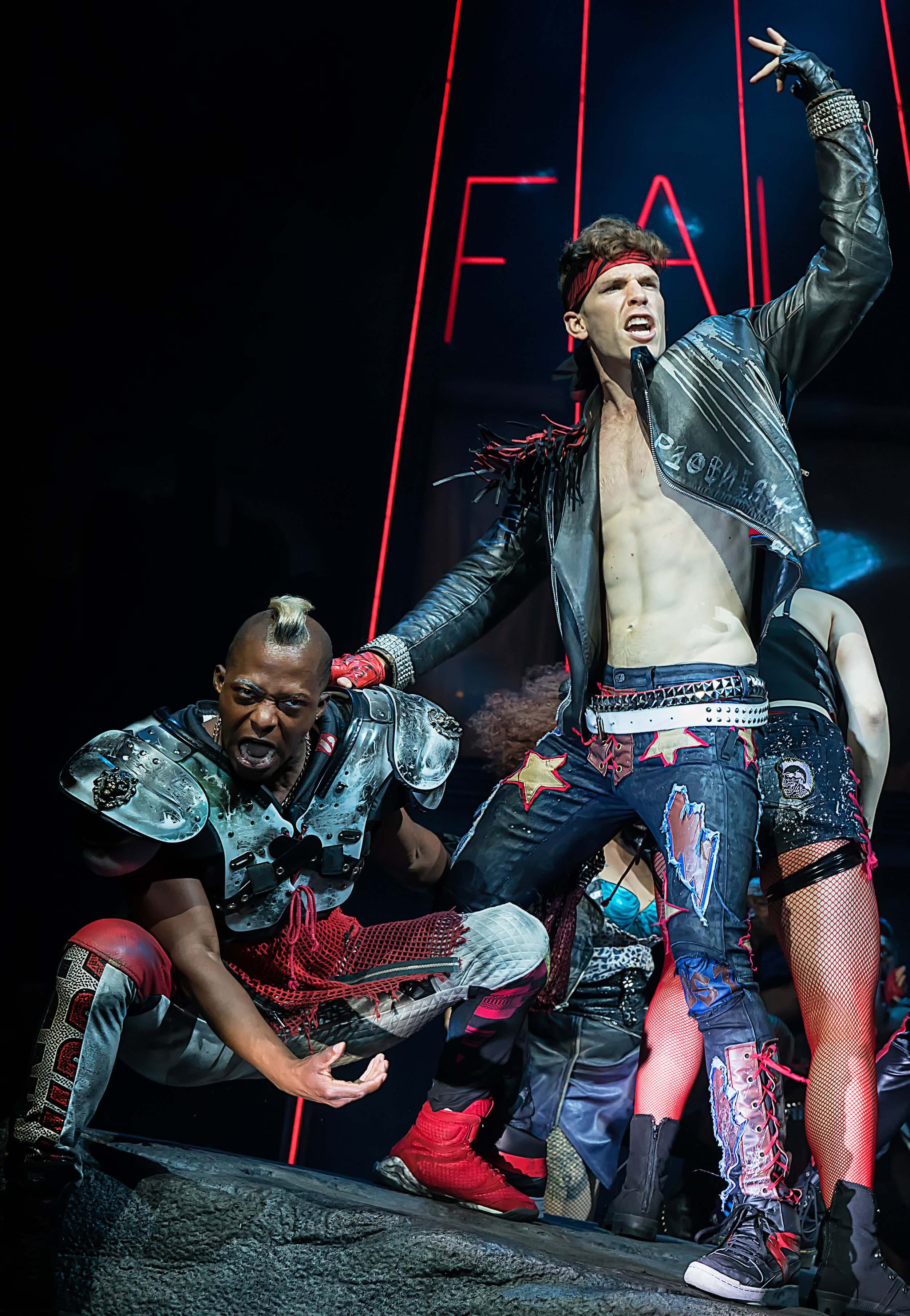Strat (Andrew Polec) and Raven (Christina Bennington) in an act of rebellion.
Jim Steinman’s Bat Out of Hell: The Musical is a high-octane show that has a way of staying with you long after the curtain closes. The songs are taken from Meat Loaf’s 1977 debut album, Bat Out of Hell and the Bat Out of Hell trilogy, which provided a narrative about love and teenage angst for a generation of rock-and-roll fans. Director Jay Scheib, best-known for contemporary stagings of classical and contemporary works, has combined straightforward musical theater elements with avant-garde practices (such as a handheld camera that isolates and projects the faces of the characters in situ). The overall affect is of a raucous rock musical that captures the spirit of a concept album.
The book Steinman has written to go with his songs draws on both Romeo and Juliet and Peter Pan. The Lost, a reference to the Lost Boys in J.M. Barrie’s play, live in an abandoned subway; the time is August 2030. Around them are ruins; a freak chemical accident has changed their DNA so that they are immortalized at 18 and can never grow up. At odds with the Lost is Falco (Bradley Dean, whose singing has the timbre closest to Meat Loaf’s and who finds much humor in the role). Falco is someone with power (a mayor? a real estate tycoon?), and he is on a rampage to clean up the city.
From left: Falco (Bradley Dean) and his wife,. Sloane (Lena Hall), have a hot moment in a car, as Scherzzo (Harper Miles) does a backup dance to the Meat Loaf classic “Paradise by the Dashboard Light.”
Falco lives with his wife, Sloane (Lena Hall, brilliant as a disillusioned drunk), and their daughter, Raven (Christina Bennington), whom he shelters from what’s “out there”; he even gives her medicine to rob her of her dreams. The whole family’s dreams have been stolen not only by medication but by failures, longing and disappointments. Falco and his wife are estranged, and Raven imagines bashing her parents’ brains out with a guitar.
One day Falco leads a raid against the Lost, and Raven sneaks out. Amid the chaos, she meets Strat (Andrew Polec, a talented singer with infectious energy), the wild-haired leader of the Lost tribe. He has a heart of gold and a mouth full of poetry. He is more Jim Morrison than Peter Pan, but Polec’s litheness and look of wonder give him an air of innocence. The two are immediately smitten, but their love is forbidden.
Steinman has arranged the songs so that the characters sing in duets rather than solos, and Scheib has staged them well. “Paradise by the Dashboard Light” offers the only character revelation as sung by Falco and Sloane. The song tells the story of two teenagers who, when they first meet, are excited to have sex. But then the woman asks if he’ll love her forever before they go any further. At first he says “Let me sleep on it”—Dean works this line with high humor—and then agrees, so that he can have sex with her. But then he feels doomed:
From left: Jagwire (Tyrick Wiletz Jones) and Ledoux (Will Banner) are members of The Lost. Photographs by Little Fang Photo.
I couldn't take it any longer Lord I was crazed
And when the feeling came upon me like a tidal wave
I started swearing to my god and on my mother's grave
That I would love you to the end of time
So now I’m praying for the end of time
To hurry up and arrive
’Cause if I gotta spend another minute with you
I don’t think that I can really survive
Praying for the end of time, so I can end my life with you.
Other songs such as “You Took the Words Right out of my Mouth” are more romantic, while “Two Out of Three Ain’t Bad,” a captivating duet sung by Zahara (the commanding and marvelous Danielle Steers) and Jagwire (the wiry and energetic Tyrick Wiletz Jones), is more cynical. “I’d Do Anything for Love (But I Won’t Do That),” seven minutes in its original, could have benefited from an edit.
Set and costumes by Jon Bausor are a mix of Mad Max, punk rock, and early ’80s MTV videos: bustiers, football shoulder pads, torn T-shirts and jackets, and leather pants. Finn Ross’s video design uses a handheld camera to stream images, but they don’t move the plot forward. Choreographer Xena Gusthart, responsible for “adapted” choreography, hasn’t given her clearly talented ensemble much to do except for small gestures and canned steps. Lighting designer Patrick Woodroffe, who has lit many rock concerts, lends this creativity to give the show that feel at times.
Still, Bat Out of Hell: The Musical is wild fun. The music captures a time in American history before social media, before Generation X and the skepticism that comes with growing up aware of the world in acute ways because of the Internet. For some good, old-fashioned rock-and-roll fun, this show does the trick.
Bat Out of Hell: The Musical runs through Sept. 8 at New York City Center (122 West 55th St.). Evening performances are at 7 p.m. Sunday-Thursday, and at 8 p.m. Friday and Saturday. matinees are at 2 p.m. Saturday and 1:30 p.m. Sunday. For tickets, call (212) 581-1212, or visit nycitycenter.org.





